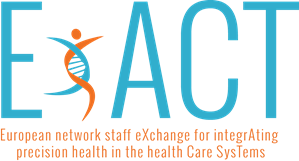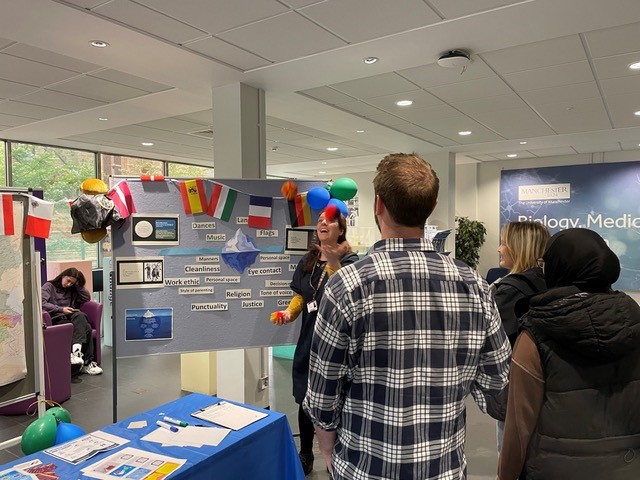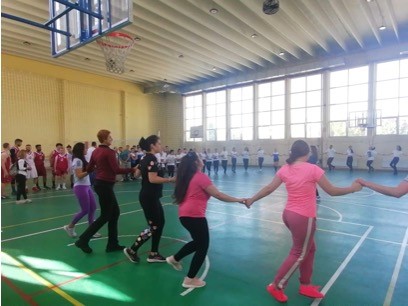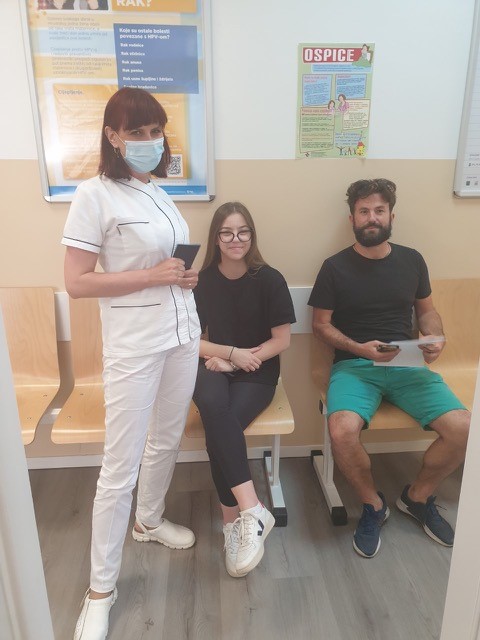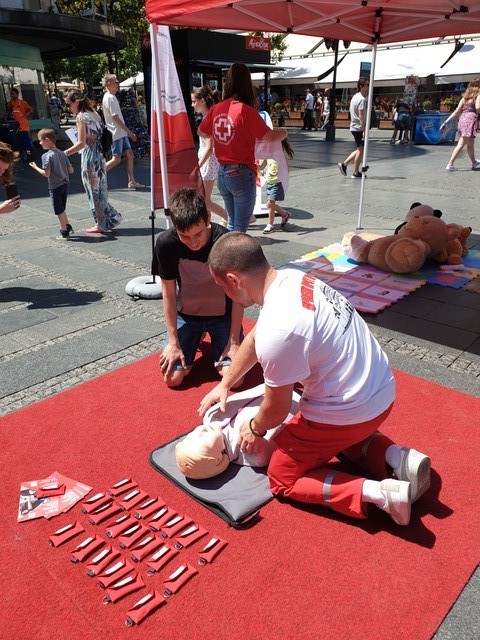 |
The European Public Health Association Newsletter - May 2022 |
1. EditorialWelcome to our May newsletter, where we report on an impressive European Public Health Week, news from EUPHA and its members, news from the European Commission, ECDC and the WHO regional office for Europe as well as on interesting news and publications in Europe. Wishing you pleasant reading, Iveta Nagyova, EUPHA president, and Dineke Zeegers Paget, EUPHA executive director |
2. EUPHA updateEUPHA president's opens the Congress of the Slovenian Preventative Medicine SocietyOn 12 May 2022, the Congress of the Slovenian Prevantative Medicine Society was organised. This congress was opened by Dr Iveta Nagyova, EUPHA president. Nagyova stated: 'The pandemic, the current war in Ukraine, and other global challenges will have long-term impacts on our healthcare and public health systems. To counteract these, investing in public health and supporting strong and resilient national health systems is now more important than ever. Europe needs to refresh and renew its vision of global health so it can robustly address new and neglected global health challenges, and adapt to an altered political and policy environment.' EUPHA president in opening of the IBTN conference in Montreal, CanadaEUPHa president, Dr Iveta Nagyova, was invited to open the conference of the International Behavioural Trials Network from 19 to 21 May. Nagyova combined public health and behavioural insights: 'Despite the complexities of modern healthcare it remains the case that human behaviour plays a critical role in health outcomes and in the efficacy of most treatments.' EUPHA executive director in webinar of OT-EuropeOn 24 May, OT-Europe (occupational therapists Europe) organised a webinar on 'Health promotion: is it on the occupational therapy agenda?' Dineke Zeegers Paget presented EUPHA's efforts in influencing policymaking and advocating for public health. The webinar was a wonderful opportunity to emphasize the continued collaboration between EUPHA and OT-Europe. EUPHAnt at the Initiative for Science in Europe's 4th Gago conference on European Science PolicyThe Initiative for Science in Europe (ISE) is an independent platform of European Learned Societies and Research Organizations operating within different disciplines and across sectors. ISE supports all fields of science at a European level, involves researchers in the design and implementation of European science policies, and advocates strong independent scientific advice in European policy making. EUPHA and ISE are working together for opportunities for young researchers. EUPHAnxt's coordinator, Monica Brinzac has been invited as speaker/panelist at the 4th Gago Conference on European Science Policy that is taking place 13 June 2022.
Report of the webinar The health workforce - in need of a "booster" for mental health protection and violence preventionYou can read the report on the webinar held on 17 March 2022. The webinar was organised by the European Public Health Association section ‘Health Workforce Research (EUPHA-HWR) and the Standing Committee of European Doctors (CPME). https://eupha.org/repository/EUPHA_newsl...Joint Statement to the Special session of the WHO Regional Committee for Europe on UkraineWe express our deep concern about the devastating impact of the war in Ukraine on people’s physical and mental health in this joint statement with EPHA, ASPHER and WFPHA. The statement addresses the lasting impacts on healthcare and public health, and concerns about the widening of health inequalities. We welcome the resolution EUR/RCSS/CONF./2 Rev.2 that was adopted at the Special Sessions of the WHO Regional Committee for Europe on 10 May 2022. Read the full statement here. https://eupha.org/repository/advocacy/20...Health Policy Platform Statement on Climate and HealthEUPHA contributed to and endorsed this joint statement by the EU Health Policy Platform’s thematic network: “Climate actionthrough public health education and training” Climate change continues to be the biggest challenge of the 21st century,with profound and growing negative consequences on public health. The cost of inaction to act in a timely and systemic manner will have catastrophic implications for the planet, the ecosystem, our livelihoods, notably the health and social systems of today and in the future. https://eupha.org/repository/HPP_Stateme...Building the public health and emergency workforce: A roadmap - endorsed by EUPHAThis month, the World Health Organization launched the ‘Building the public health and emergency workforce: a roadmap’. EUPHA, including the Health workforce research section, endorse this roadmap. https://www.who.int/news-room/events/det...What are your views on personalized medicine?This month, the survey on personalized medicine is launched by the ExACT project. ExACT stands for: European network staff eXchange for integrAting precision health in the health Care sysTems, and EUPHA is a consortium member of this project. 10th International Public Health FestivalEUPHAnxt coordinator Monica Brinzac has been invited to the 10th annual International Festival of Public Health (21 July), organised by the University of Manchester in association with the The Epidemiology and Public Health Group, and the Manchester Urban Institute. This year's Festival will have two main themes: 'Ending Violence against Women and Children: Time for Change' and 'Urban Health' |

3. European Public Health WeekWe look back at another successful European Public Health Week. There were 235 events, in 21 different languages and organised within 32 different countries. Five kick-off events were organised by EUPHA and daily partners: Association of Schools of Public Health in the European Region (ASPHER), European Centre for Disease Prevention and Control (ECDC), the Health and Environment Alliance (HEAL) and ENBEL, GAMIAN Europe and the European Observatory on Health Systems and Policies. The span of the events was very broad: webinars, lectures, first aid courses in the city centre, physical outdoor activities, networking session, radio interviews, publications and digital displays to mention some. There are many ways to share knowledge and bring together public health professionals and those interested in health. What all events had in common during the EUPHW was the motive to organise an event: improving health throughout the life course of all people living in Europe. Our president Iveta Nagyova: "The European Public Health Week is an action-based event where we can showcase the strength and width of public health, provide visibility for our national public heath associations, public health workforce in general, and to educate the general population on health priorities.” We are very impressed with the high numbers of events that have been organised and the commitment of all stakeholders, members and friends to be active during the week. We have received tremendous support from the WHO Regional Office for Europe, from the European Commission and all of our daily partners. We are grateful to work with such dedicated public health professionals! Have a look at our Wakelet to get an impression of the EUPHW or read the press release that was published.
|
4. European Public Health Conference15TH EUROPEAN PUBLIC HEALTH CONFERENCE, 9 - 12 NOVEMBER 2022 - STRENGTHENING HEALTH SYSTEMS: IMPROVING POPULATION HEALTH AND BEING PREPARED FOR THE UNEXPECTED.PLENARY PROGRAMME Plenary 2: Benefits and challenges of the European Health Data Space The creation of a European Health Data Space (EHDS) is one of the key components of a strong European Health Union. The EHDS aims to improve and support healthcare delivery within Europe by allowing public health data to be accessible throughout Europe. The EHDS also aims to promote better access and exchange of different types of health data for research and policy purposes. The EHDS is expected to bring great benefit, but it also brings challenges related to technology, governance and privacy. The exchange of data at European level means that health data from different sources need to be able to talk to each other. Making the data Findable, Accessible, Interoperable, and Re-usable (FAIR) is key to the success of the EHDS. Moreover, the diversity of Europe’s health information systems need to be taken in account. The EHDS will also have to be transparent to ensure privacy of personal information. Moderators: Marieke Verschuuren, EUPHA, and Isabel de la Mata, European Commission Speakers: to be announced shortly on our website. Plenary 4: Reorienting health services: the transformational potential of health promotion Over the past decades the nature of our disease burden has shifted from communicable to chronic diseases such as cardiovascular diseases, diabetes, cancer and mental ill health. They mostly result from an accumulation of unhealthy living patterns since across the life course. These behaviours in turn are shaped by the social, environmental, cultural and economic conditions in which we live, grow, work and age. Our health services, with a traditional curative approach, are not equipped for this chronic epidemic. There is an urgent need to shift our health services away from the predominant focus on cure and towards prevention, and for policy makers to invest in ensuring healthy living environments and societies. This plenary session will provide examples in which health-promoting approaches can reorient health services, strengthen community oriented primary care and prevent chronic diseases. Moderator: President or Director EuroHealthNet Speakers: Rüdiger Krech, World Health Organization; Susan Michie, UCL Centre for Behaviour Change, London, United Kingdom; Jan De Maeseneer, Chair of the European Commission Expert Panel on Effective Ways of Investing in Health; Jet Bussemaker, Chair of the Council of Public Health & Society, Netherlands; Cristiano Figueiredo, National School of Public Health, NOVA University Lisbon, Portugal. REGISTRATION IS OPEN WITH BENEFITS FOR EUPHA MEMBERS Registration for the in-person 15th EPH Conference is open. You can benefit from early bird registration fees until 1 September. We are expecting over 1,500 delegates in Berlin. Meet your colleagues at the largest public health event in Europe during four fully packed conference days. EUPHA members and delegates from Germany pay € 670 before 1 September, non-members € 760, Students, trainees and colleagues from low- and middle-income countries pay € 400 (all including VAT). More information here PRE-CONFERENCES Pre-conferences are held on Wednesday 9 November. The full programme will be announced shortly on our website. Pre-conferences are held for half day (morning or afternoon) or full day. Attending a pre-conference requires separate registration. This can be done while registering for the main conference but can also be added to your existing registration at a later time. Registration fees are €75 and €150. Sponsored pre-conferences are €20. (all sessions inclusive network buffet lunch). LUNCH SYMPOSIUMS We offer an exciting lunch symposiums programme to be held on Thursday 10 and Friday 11 November. Lunch symposiums are open for all delegates, no separate registration required. Enhancing pathways for vaccine assessments and national decision-making – a driver of resilient health systems As Europe begins to look beyond the pandemic, there is an opportunity to reflect on the future needs of the vaccine ecosystem as a driver of health system resilience and sustainability. A key area for attention and policy action concerns the country-specific pathways through which vaccines are assessed and decisions made on their inclusion in National Immunisation Programmes (NIPs). This lunch symposium will bring together key stakeholders from across Europe’s immunisation ecosystem to consider the actions that are needed to enhance national vaccine pathways. More lunch symposiums will be announced shortly on our website. ABSTRACT SUBMISSION RESULTS Thank you for submitting your abstract for the EPH Conference 2022. We received a record number of 2,185 single abstracts which are now being reviewed by our experts in the International Scientific Committee. Results of the abstract submission will be communicated to you by mid-June. Keep an eye on your inbox and spam folder! Accepted abstracts are published in the Abstract Supplement of the European Journal of Public Health but only if you have registered for and presented at the conference. PANDEMIC PREPAREDNESS There are currently no restrictive measures for the event industry in place in Berlin. Event organizers are free to decide whether and how to make use of protective measures. For the EPH Conference 2022 we will follow the recommendations for responsible events to ensure our delegates can attend the conference safely. Current measures in Berlin can be followed in detail on the websites of VisitBerlin and the State of Berlin. CONFERENCE VENUE The 15th EPH Conference will be held in the hub27 Berlin, part of Messe Berlin. Hub27 is a modern, multifunctional conference centre with ample room for networking and meeting colleagues. It is easily accessed by U-Bahn and S-Bahn from all parts of Berlin. You can reach Berlin by train from everywhere in Europe. Long-distance high-speed trains arrive at and depart from the Hauptbahnhof. Flights to and from the new Berlin-Brandenburg International Airport (BER), 20 km from the city centre. |
5. EUPHA members updateCyprus Epidemiology and Public Health Association - webinarEUPHA's newest member, CyEPHA, organised a webinar on 20 May 2022 discussing 'Public Health Risks and Moral Responsibility: The Case of the Coronavirus Pandemic'. EUPHA's executive director, Dineke Zeegers Paget, opened this event which included a lecture from Dr Jessica Nihlén Fahlquist and a panel discussion with the audience. French Society of public health: special newsletterThe SFSP published an extra newsletter (Flash) on the European Public Health Week. This included an interview with EUPHA's executive director, Dineke Zeegers Paget Le dossier du mois - Semaine européenne de la santé publique (EUPHW) (sfsp.fr) Spring 2022 ASPHER NewsletterThis newsletter presents the work of ASPHER's taskforce on war, news and events of the ASPHER network, COVID-19 news and much more. https://www.aspher.org/download/1100/asp... |

6. European Journal of Public HealthAdvance Articles - May 2022The LoCo (Lockdown Cohort)-effect: why the LoCo may have better life prospects than previous and subsequent birth cohorts |
7. Call for proposals, job opportunitiesAssociation of European Cancer Leagues (ECL) is recruiting 2 new Policy Officers and 1 EU Research Projects OfficerFor the tight-knit team in Brussels to help us secure a fit-for-purpose team, value-based membership, strong networks and partnerships, and outstanding communication. All to support the top-notch advocacy and lobbying work of ECL. Health Care Without Harm is looking for an International Climate DirectorThe International Climate Director is responsible for leading and overseeing HCWH’s global climate program and implementing the organization’s climate strategy. Call for abstracts: Behaviour Change for Health and SustainabilityThe UCL Centre for Behaviour Change invites you to submit an abstract to the 8th international behaviour change conference Behaviour Change for Health and Sustainability. This is an online event running 7 - 9 November 2022.
https://uclpsych.eu.qualtrics.com/jfe/fo... IHLA Health Literacy ExplorersThe IHLA Health Literacy Explorers is looking for motivated public health professionals to join their global space for young/early career/new voices in health literacy. |
8. Interesting newsHealth system performance assessment: new framework for policy analysisExperts from the World Health Organization (WHO) and the European Observatory on Health Systems and Policies have produced a long-awaited framework to conceptualize the assessment of health system performance. Health system performance assessment: a framework for policy analysis, published with support from the UHC2030 Health System Assessment technical working group (TWG) and the Universal Health Coverage Partnership, will help policy-makers to analyze possible origins and impact of poor performance on a particular health system outcome. In countries, especially those that receive external assistance, different and overlapping health systems assessments are often supported by different partners. The entry point for the UHC2030 TWG to develop this framework was the need for harmonizing and aligning the analysis of health system assessment (HSA) information across countries and HSA tools. The book places the newly introduced framework within the current evidence base while ensuring it is fit for the policy challenges of the 21st century. It offers policy-makers a strong performance orientation to analyze health system data and information. Read more here. What are the commercial determinants of cancer control policy?European Observatory on Health Systems and Policies | Webinar recording | 27 April 2022
ECO Statement to the WHO Europe Regional Committee Special Meeting on 10 May 2022European Cancer Organisation | Statement | 10 May 2022 Decades of the specialist nurse 2020-2030 programme, launched by ESNO (European Specialised Nurses Organisation) on 12 May 2022 as part of the campaign #Caring4Nurseshttps://fonse.eu/wp-content/uploads/2022...Infrographic: Mental health and citiesHEAL's new infographic explores the links between cities, climate change, air pollution and mental health – and how we can create mental health-friendly cities. https://www.env-health.org/mental-health...False fix: the hidden health impacts of Europe's fossil gas dependencyHEAL | Analysis | 18 May 2022 New Tobacco Atlas: The Scale of the Tobacco Epidemic and the Progress MadeVital Stategies | 18 May 2022 US supreme court abortion reversal would be global 'catastrophe' for womenThe Guardian | 18 May 2022 New insights into antibiotic resistanceScience Daily | 25 May 2022 Human rights violated, access to health neglected: Roma in 'mental distress'Euractiv | Health brief | 25 May 2022 An Economy of Wellbeing for health equityEurohealthnet | 6 May 2022 |
9. Upcoming courses and conferences
|
10. Interesting publicationsFront-of-pack Nutrition Labelling: A Tussle between EU Food Law and National MeasuresIn May 2020, the European Commission published its Farm to Fork Strategy, which committed to propose harmonised mandatory front-of-pack nutrition labelling (FoPNL) to help empower consumers to make informed, healthy food choices. This article explores how EU food information law regulates FoPNL, and the implications for the development of effective FoPNL. http://repository.essex.ac.uk/31919/9/Go...Qualitative modelling of social determinants of health using group model building: the case of debt, poverty, and healthInternational Journal for Equity in Health | Research | 19 May 2022 Pandemic treaty: a chance to level up on equityThe BMJ | Opinion | 20 May 2022 Measuring the availability of human resources for health and its relationship to universal health coverage for 204 countries and territories from 1990 to 2019: a systematic analysis for the Global BurThe Lancet | Article | 23 May 2022 Global survey on COVID-19 beliefs, behaviours and normsNature | Resource | 23 May 2022 Taking stock of global commitments on antimicrobial resistanceThe BMJ Global Health | Original Research | 19 May 2022 Global health education in high-income countries: confronting coloniality and power asymmetryThe BMJ Global Health | Analysis | 19 May 2022 Corporations and Health: The Need to Combine Forces to Improve Population HealthInternational Journal of Health Policy and Management | Editorial | 18 May 2022 The public health playbook: ideas for challenging the corporate playbookThe Lancet Global Health | Viewpoint | 24 May 2022 |
11. European Commission newsStatement by Commissioners Stella Kyriakides and Jutta Urpilainen - Towards a new EU Global Health StrategyOn 19 May at the G7 Development and Health Ministerial, Commissioners Kyriakides and Urpilainen have announced the launch of the work on a new EU Global Health Strategy. They have issued a statement, calling on all stakeholders to join the Commission in the developpment and implementation of this new EU Global Health Strategy. https://ec.europa.eu/commission/presscor...Proposal for a regulation of the European Parliament and of the Council on the European Health Data Spacehttps://ec.europa.eu/health/system/files...The EU Health Policy Platform presents the 2021 Joint Statements: recording and presentations now available!Following the EU Health Award Ceremony on 4 May, the EU Health Policy Platform concluded its annual meeting on 5 May presenting the final 2021 Joint Statements by the Thematic Network leaders.
Watch the recording of the Ceremony. https://www.eu-hpp-annual-meeting.eu/Par...Sustainable development in the European Union -- Monitoring report on progress towards the SDGs in an EU context -- 2022 editionIn the lastest SDGs report published by Eurostats, you will find key indicators measuring progress towards SDG 3. https://ec.europa.eu/eurostat/documents/...Stakeholder consultation on the draft Code of practice on standardisation for researchersThe Code of Practice shall provide a set of recommendations, relevant for EU, national and local research and innovation (R&I) programmes, on how beneficiaries of public R&I funds can best valorise project results through standardisation. |
12. European Centre for Disease Prevention and Control newsEurosurveillance - Volume 27, Issue 18, 05 May 2022Rapid communication Risk assessment: Monkeypox multi-country outbreakCases of monkeypox (MPX) acquired in the EU have recently been reported in nine EU Member States (Austria, Belgium, France, Germany, Italy, Portugal, Spain, Sweden, and the Netherlands). Competencies for applied epidemiologists now available in all EU/EEA languagesECDC has published a report which contains the results of a review and update of the core competencies in applied infectious disease epidemiology for mid-career applied epidemiologists. Eurosurveillance - Volume 27, Issue 19, 12 May 2022Miscellaneous Eurosurveillance - Volume 27, Issue 20, 19 May 2022Editorial |
13. WHO newsWHO European Regional Obesity Report 2022This report examines the growing challenge and impact of obesity in the Region, building on past publications and aligning with initiatives to tackle cancer. It focuses on managing obesity throughout the life course and tackling obesogenic environments; it also considers more recent challenges, including problematic digital marketing to children and the impact of the COVID-19 pandemic on obesity prevalence. https://www.euro.who.int/en/health-topic...Understanding the behavioural and social drivers of vaccine uptake WHO position paper - May 2022This is the first position paper to be published by WHO on the behavioural and social drivers (BeSD) of vaccine uptake. It summarizes the development of new tools and indicators to assess the BeSD of vaccine uptake for childhood and COVID-19 vaccination, enabling decision-makers on immunization policy, programme managers, and partners to address under-vaccination through an enhanced understanding of the underlying causes. https://apps.who.int/iris/rest/bitstream...WHO Strategic Priorities on Antimicrobial ResistanceThis document highlights the key achievements and next steps of the WHO Antimicrobial Resistance Division at Headquarters, Geneva. AMR is a cross-cutting strategic issue with extensive work in other departments and divisions, and at regional and country level. https://apps.who.int/iris/rest/bitstream...Reducing the harm from alcohol - by regulating cross-border alcohol marketing, advertising and promotion: a technical reportThis comprehensive report details the full extent of the way that alcohol is being marketed across national borders – often by digital means – and often regardless of the social, economic or cultural environment in receiving countries. It shows that young people and heavy drinkers are increasingly targeted by alcohol advertising, often to the detriment of their health, and highlights the need for more effective national regulations and better international collaboration. https://apps.who.int/iris/rest/bitstream...Health systems resilience toolkit: a WHO global public health good to support building and strengthening of sustainable health systems resilience in countries with various contextsThe Toolkit serves as a compendium of technical resources to support countries in strengthening the resilience of their health systems and provides technical grounding and clarity on the conceptualization and operationalization of health systems resilience https://apps.who.int/iris/rest/bitstream...First-ever meeting of WHO mental health coalition focuses on Ukrainians' resilience and concrete steps towards changeThe first-ever meeting of the Pan-European Mental Health Coalition, held on 4–5 May, kicked off with an hour-long briefing led by WHO experts and mental health care practitioners supporting Ukraine. https://www.euro.who.int/en/health-topic...Setting up a behavioural insights unit - WHO launches a set of considerations to support countriesWHO/Europe has launched a new document, providing support to countries that wish to set up a unit for behavioural insights (BI) in health. The document provides guidance on key considerations, ranging from the location of a unit and staffing, to ensuring impact and sustainability. https://www.euro.who.int/en/health-topic...Climate change is increasing the risk of heatwaves: preparing for a warm and dry summer in the European RegionAs climate change is projected to significantly increase people’s exposure to heatwaves, and European weather services are expecting summers to be warmer and drier, WHO/Europe calls on countries to take measures to avoid adverse health impacts. https://www.euro.who.int/en/health-topic...Special session of the WHO Regional Committee for Europe: summary and outcomeThe virtual special session, moderated from WHO/Europe in Copenhagen, Denmark, was called by Ukraine and 42 other Member States, including all 27 European Union Member States.The main focus of the special session was a draft resolution proposed by 38 Member States with 3 key requests:
Seventy-fifth World Health Assembly - Recordings and daily reportsThe Seventy-fifth World Health Assembly was held in Geneva, Switzerland, on 22-28 May 2022. The theme of this year’s Health Assembly was: Health for peace, peace for health. New climate change country profiles show key health risks and priority areas for action in European RegionDevelopped by the WHO and the United Nations Framework Convention on Climate Change (UNFCCC), the Health and Climate Change Country Profiles give an overview of critical areas for action to combat these threats, and provide links to available resources. Developed in collaboration with national health services, they summarize evidence of the climate hazards and health risks facing countries. https://www.euro.who.int/en/health-topic...World Health Assembly agrees historic decision to sustainably finance WHOIn one of the key recommendations in the Working Group’s report to the Health Assembly, Member States target a gradual increase of their assessed contributions (membership dues) to represent 50% of WHO’s core budge. The report includes other recommendations, such as exploring the feasibility of a replenishment mechanism to broaden the financing base. https://www.who.int/news/item/24-05-2022... |
|
This newsletter received co-funding under an operating grant from the European Union’s Health Programme (2014-2020). The content of this newsletter represents the views of the author(s) only and is his/her sole responsibility; it cannot be considered to reflect the views of the European Commission and/or the Consumers, Health, Agriculture and Food Executive Agency or any other body of the European Union. The European Commission and the Agency do not accept any responsibility for use that may be made of the information it contains. |
|
Unsubscribe If you would like unsubscribe from the EUPHA newsletter then please click here. |

